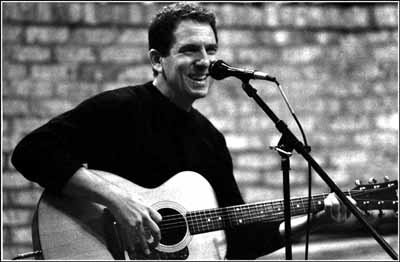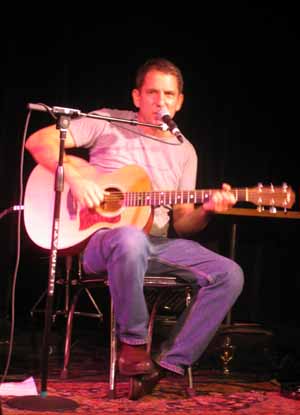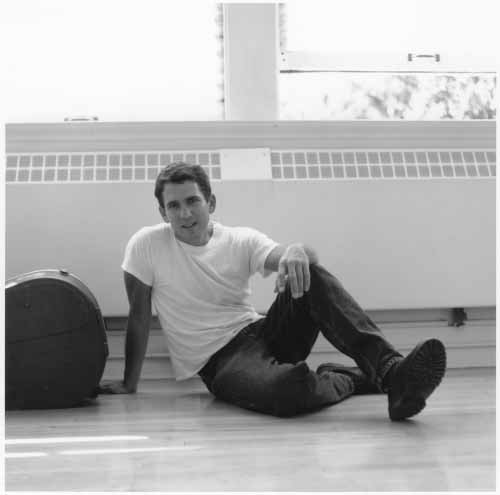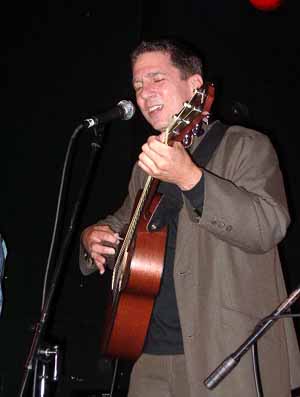FEBRUARY 2007 Featured Player of the Month
singer/songwriter/guitarist Brady Earnhart
Interview by Robert Urban for GAY GUITARISTS WORLDWIDE

Over the past 10 years Brady has built a reputation as a songwriter’s songwriter up and down the Atlantic coast. His moving, literate, and often humorous songs have been compared to those of Paul Simon, Nick Drake, and Joni Mitchell. His song “Gargoyle” won the Gold Medal in the Folk category of the 2002 Mid-Atlantic Songwriting Contest, and his two CD’s have been in heavy rotation on gay radio shows across the country.
“so brilliant and wondrous that it’s almost unfair to write about any other CDs in the same column” ..."a sophistication and sensitivity that is rare in the contemporary queer music scene.” - Bay Area Reporter, Windy City Times
“He may be in the tradition of the folk troubadour, but don’t be fooled—Earnhart is singing art songs. Like the work of Stephen Foster or Aaron Copland, this work has a native American beauty.” - Washington Blade
In addition to writing, recording, and performing his songs, Brady currently teaches American Literature at the University of Mary Washington.

- What brand/model/year instrument(s) do you record and play out with?
My favorite is a smallish Taylor 412 I got ten years ago at The Guitar Shop in Washington, DC. They sat me down three feet from a solid wall so I could hear the sound coming back at me, and the Taylor blew away the comparable Martins, Guilds, and Gibsons they brought in. I also have a 1974 Martin D18 and a new low-end but sweet National resonator guitar.
- What brand/model/year amps & effects (if any) do you use?
I use a b-band piezo pickup that has a really natural sound I love. Besides standard and dropped-D tunings, I like the big, atmospheric sound of open-D, DADGAD, DGDGAD, and CGDGCD, especially the lush minor-9th chords and harmonics they give you access to.
- Who are your main influences as an instrumentalist? Which artists? Which bands? Instrumentalist? Which artists/bands were your favorites in your youth?
I started playing in the seventies, trying to follow up on what usual suspects like Joni Mitchell, Donovan, Paul Simon, James Taylor, Neil Young, and Leonard Cohen were doing on their early albums. I also got addicted to the cool things that bands like Yes and King Crimson did with melody and odd time signatures.
My playing changed a lot when I went to college and got exposed to the organic and sensual pulling, snapping, and slapping style of John Martyn—to my ears, the most successful and erotic fusion of British folk and American blues. (Check out his album Solid Air, with its title track dedicated to his friend Nick Drake.) Later my shelf broadened to include Dylan, Vic Chesnutt, the Catalan folk singer Raimon, Richard Buckner, Elliott Smith, Bonnie Prince Billy, Jane Siberry, Ida, Keith Jarrett, Brad Mehldau, the poet Jack Gilbert, my friends Danny Schmidt and Paul Curreri . . . the list is long and growing. I try to make my playing a watershed that all kinds of influences can seep into.

- Tell fans about your luv for your particular style of music, as opposed to other styles - how it became your favorite style of rock, etc
Luv l-u-v? (Sorry—I’m an English teacher and easily shocked.) But seriously: I can say I fell in love with acoustic guitar on a ski trip in eighth grade, when everybody crowded into the room of a girl who had broken her leg on her first run of the first day. A few people pulled out guitars and sang things like “Dona Dona,” “The Boxer,” and “House of the Rising Sun.” Simple, but electric. I was struck by what that did to a room full of people—it was a power I wanted to tap into.- Do you play/compose/record only your own original music? Do you do any other work in music - e.g. teaching, recording session work, hired gun, producing, etc? Does your playing appear on recordings of any other artists?
Since I’m more of a songwriter than a performer, I usually don’t see much reason to do covers, though I did put two relatively obscure ones (a Scottish folk song and a Basque lullaby) on my first album because I felt inspired to come up with pretty novel arrangements of them. Having a functional knowledge of music reading from grade-school piano lessons,
I write all my own arrangements (mostly for cello) and score them on a cheap but really useful Cakewalk program. Nobody’s asked me to play on their albums, but I’ve written string and choral arrangements for a Virginia band called The Naked Puritans and for the acoustic singer-songwriters Michael McConkey and Mary Gordon Hall
- Is there a particular favorite solo or part you played on a recording, or a certain piece of composed music you wrote, that you feel represents your finest work?
I like guitar accompaniment best when it uniquely suits the emotion and ideas of a given song. In my own work, I guess that comes out best in the finger-picking styles I use on “Garden” and “October.” The playing on those songs is as close as I can get it to sounding completely native to the lyrics.
Any special thoughts on your instrument, and what it's meant to you in your life?
Making songs—which for me means making guitar songs—has given me a way to put terribly strong personal confusion into shapes that I can deal with objectively. It’s like psychic architecture. I can’t imagine doing without it.
Can you relate any special feelings or experiences about being a glbt player in the mostly straight music world... especially regarding your formative/learning years on your instrument?
I’m sure that part of the loneliness that made me take refuge in guitar came out of the isolation of being different, and at the time knowing almost nothing about what kind of difference that was. But I have to say too that over the fifteen or so years I’ve been playing in public I can’t remember ever seeing a homophobic reaction even to my explicitly gay songs like “Something About Him” and “Honey Don’t Think Your Mama Don’t Know.” On the whole, indy singer-songwriter audiences are pretty liberal, and willing to let a love song resonate with them even if they don’t share its sexual orientation.
- For a glbt player - how does the overall music scene differ today
from years ago?That’s a big question! I think of Ellen, Will and Grace, Queer Eye, Boys Don’t Cry, Brokeback Mountain; the coming out of people like The Indigo Girls, George Michael, Melissa Etheridge, and Elton John; the sad outing of Rock Hudson; the advocacy of straight celebrities like Elizabeth Taylor and Garth Brooks—in my lifetime, things like these have revealed and accellerated the trend toward liberalization that began after World War II. On the music scene, that’s meant that we get the relaxed attitude of Erin McKeown or Rufus Wainwright instead of freak-show exploitation jobs like Liberace and Tiny Tim. So far, yay.
The next step for gay men, I think, is in realizing that “our music” can mean more than Cher and Madonna, more than that anesthetic, thinly sexual, boom-chik drone that assaults us in the bars. Lesbian singer-songwriters can find audiences pretty easily, but if I say I write songs and play acoustic guitar, the reaction from a lot of gay guys is, “Why would you do a thing like that?” I think that’ll change—in my lifetime, I hope. Intimate gay male music is the most underdeveloped musical niche I can think of.
- How is the overall music scene in your locale?
There’s a lot of excellent home-grown old-time and bluegrass music all over Virginia, of course, but my favorite local scene is Charlottesville, where you find all kinds of great players and really literate singer-songwriters cross-pollinating with everything from bebop to baroque to belly-dancing. Dave Matthews isn’t exactly typical, but it’s not surprising that that’s where he got his start.

- Any advice for young glbt players?
Find somebody just a little better than you are who’s willing to show you new things. Buy something you can record yourself on—it’ll make you want to bring your fingers up to the standards of your ears. Play every open mic you can—gay or straight. And if you’re not out already, come out. Think of being gay as a strength. You have a take on life that sets you apart from the ordinary coffeehouse crowd. Use it.
- What are your current and future musical projects?
I’ve got a new protest rocker (free mp3 at http://bradyearnhart.com/songs.html) that aims to make fun of the anti-gay marriage amendment Virginians will be voting on this November. I’m playing at Fredericksburg Pride later this month and then up in P’town on September 15 as part of a gay men’s music event that Peter Donnelly is putting together. I just started working with a really good cellist named Rebecca Maxon. And I’ve got almost enough new songs to start recording my third CD. All in all, I feel like I’m in a pretty good place.
More on BRADY EARNHART at: bradyearnhart.com
______________________
Read more GGW's "GUITARIST OF THE MONTH" Interviews
Go to more Robert Urban Music & Arts Reviews
Return to Robert Urban Homepage